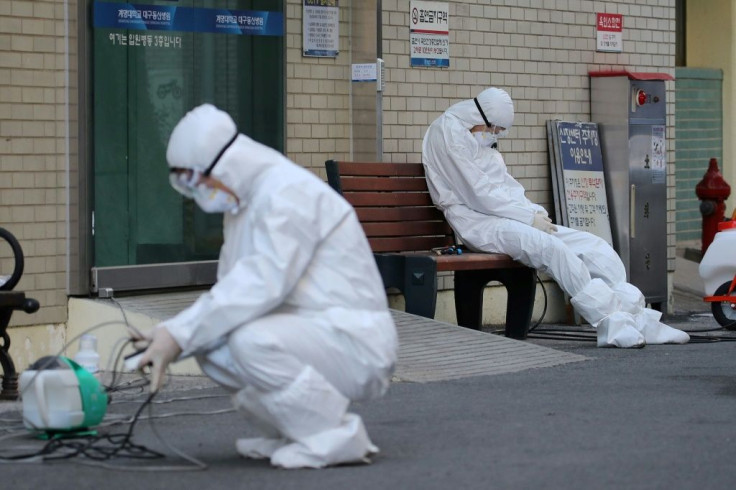Coronavirus Update: Infections Soar In South Korea As Economic Impact Assessed

KEY POINTS
- South Korea has at least 830 virus infections, the highest number outside China
- Cases are concentrated in the city of Daegu and linked to the Shincheonji Church
- President Moon Jae-in has placed South Korea under a “red alert" - the highest warning level
South Korean President Moon Jae-in has placed his country under a “red alert,” the highest level, as it grapples with soaring cases of coronavirus – now at more than 830, the highest such figure outside of mainland China.
Thus far seven South Koreans have died from the virus.
Under a red alert the government has great leeway in closing public facilities and imposing travel bans.
The center of the virus outbreak is in Daegu, a southeastern city of 2.5 million about 150 miles from the capital Seoul, where several hundred members of a cultish church group, Shincheonji Church of Jesus, are believed to carry the infection. But because of the secretive nature of the church, the government cannot identify and contact all members.
More than half of the country’s coronavirus cases are connected to the church, while more than 9,000 members are in quarantine. Church leaders have declared they are doing everything possible to halt the epidemic and appealed to the public not to spread lies and disinformation about the organization.
But much of the anger in Daegu has been directed toward the Shincheonji church.
“They could still be walking around the streets of Daegu, and officials haven’t been able to track all of them down,” said Kwon Oh-young, a 70-year-old taxi driver.
Kim Young-oh, president of the Daegu Merchant Association, raged that “the city has been annihilated because of Shincheonji church.”
Daegu has been described as a ghost town with few people in public and many shops and businesses closed.
“Shincheonji members hide who they are so that their friends and even their family members do not know they belong to the church. Now the government is unable to contact hundreds of Shincheonji members who attended the Daegu church,” said Ji-il Tark, a professor of theology at Busan Presbyterian University. “It might be painful and difficult to disclose they are Shincheonji members because that means they lied to their loved ones so that there is a possibility they could stay in danger of infection, which is the [scariest] scenario.”
U.S. military personnel stationed in Daegu are prohibited from visiting off-base establishments.
“The changes have been dramatic,” said Daegu resident Nah Young-jo.
Cases of the virus have also emerged in Gwangju, a southwestern city, and the island of Jeju off the south coast, suggesting the possibility of a widening epidemic.
“If we fail to effectively prevent the spread of the virus into the local communities, there would be a large possibility [that the illness] spreads nationwide,” said Kim Gang-lip, South Korea’s vice health minister.
Jung Eun-kyeong, chief of South Korea’s Centers for Disease Control and Prevention, called on people in the country to limit any public activities and avoid traveling by train.
“The number of cases in South Korea seems high at least in part because the country has high diagnostic capability, a free press and a democratically accountable system. Very few countries in the region have all those [aspects],” said Andray Abrahamian, a visiting scholar at George Mason University Korea.
But some South Koreans have criticized the president and the government for failing to adequately prepare for the virus outbreak.
“The coronavirus situation spun out of control as the president was mired in optimism, saying that the outbreak wouldn’t last long,” the Chosun Ilbo newspaper wrote in an editorial, “If we can’t block the virus, the whole country will be in danger.”
Kim Seung-dong, an opposition politician in Daegu, held a sign that read: “Everyone in Daegu is dying of the ‘Moon Jae-in Virus.’”
“This administration must be held accountable for failing to respond early to the coronavirus,” Kim wrote on Facebook.
Hundreds of thousands of South Koreans have already signed a petition demanding the country seal off its borders to Chinese nationals.
“This is an unusual emergency situation,” President Moon said on Monday. “Instead of limiting our imagination with regard to policy, we have to make bold decisions and implement them quickly.”
More than a dozen nations have slapped travel restrictions on South Korean citizens, while the U.S. and Australia have issued advisories against traveling to South Korea.
Analysts are bracing for the economic fallout from the spreading virus.
South Korea’s KOSPI composite index plunged 3.9% on Monday while the KOSDAQ index plummeted 4.3%. The won currency tumbled to a six-month low against the U.S. dollar.
“The virus appears to have a bigger-than-expected negative impact on the financial markets,” said Park Sang-hyun, an economist at HI Investment & Securities Co. “The point is whether the virus outbreak would stabilize in end-February or early March.”
First Vice Minister Kim Yong-beom warned that the virus epidemic poses a “large concern that it will limit the trend of economic recovery started late last year.” He cited, among other things, a decline in domestic consumption and exports to China.
Justin Jimenez of Bloomberg Economics said that the country’s central bank, Bank of Korea, is likely to ease at its next meeting in a “pre-emptive move to cushion the economic impact of the coronavirus outbreak.”
© Copyright IBTimes 2024. All rights reserved.




















